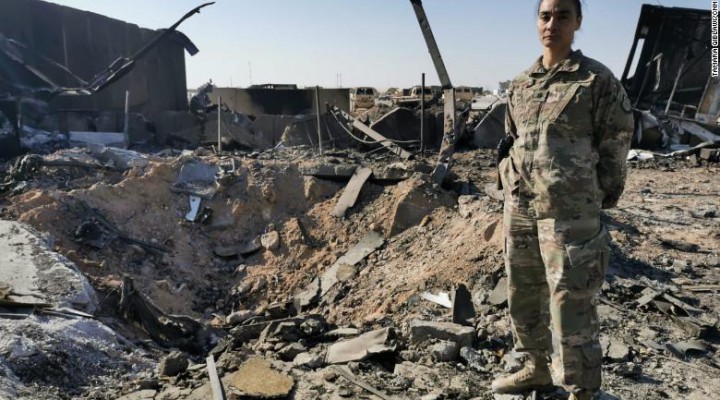Subscribe to get access
Read more of this content when you subscribe today.

In the last decade, the US, Israel and their allies explored every single avenue in an attempt to subject Iran to their will, weaken or even defeat the “Islamic Republic” and, for many years, aimed to change the political regime. The war on Syria (one of Iran’s strategic allies), the partition of Iraq, the war on Hezbollah, the support to al-Qaeda in Syria, the permission for ISIS to grow undisturbed, the assassinations and acts of sabotage, the rejection of the “nuclear deal” and the “maximum pressure” were the main choices and the most hurtful tools used in an attempt to defeat Iran and its allies in the Middle East. After a decade of serious and perilous attempts and wars, were these options successful?
The US “maximum pressure” aimed to cut of 80% of Iran’s oil revenues and indeed managed to “deny Iran some $200 billion in lost foreign-exchange income and investment”, as President Hassan Rouhani put it. The result was very painful for Iran and its economy, particularly during the combat against the Covid-19 pandemic. The current US administration, just a few weeks before departing, decided that the entire Iranian financial sector was a threat, forcing all international and in particular European banks to stop all transactions with Iran. But President Donald Trump’s administration never had the satisfaction to see Iran’s economy collapsing notwithstanding the high inflation and unemployment.
In May and June 2019, the United States accused Tehran of sabotaging six oil tankers just beyond the Straits of Hormuz. On the 20thJune, Iran downed an RQ-4A Global Hawk, one of America’s most sophisticated and expensive drones, with its domestically made medium-range air defence missile Khordad-3, flying over Iranian airspace. Trump spoke about possible military retaliation, but claimed to have called it off at the last minute. In fact, Iran sent a message to the US via the Swiss Embassy in Tehran that it won’t tolerate any attack against its territory and will swiftly respond against the US military bases spread over the region.
But President Trump did venture to assassinate the leader of the “Axis of the Resistance”, the Iranian brigadier General Qassem Soleimani who led the war against the “Islamic State”, ISIS, in the last decade in Lebanon, Syria and Iraq. It was a strong hit to Iran that was pushed to respond and dared to hit the largest US base in Iraq with dozens of precision missiles. Trump was caught between an all-out-war that could inflict huge destruction on both sides, and casualties among US servicemen that would have cost him re-election for a second term (because he strongly believed himself to be in a position to defeat his opponent Joe Biden). Also, it is easy for the US to start a war but it is far from being a walkover when the target is Iran and when the allies of the “Islamic Republic” are spread all over the Middle East, ready to take part in the war. It is also not within the competence of the US to end a war, and its last invasion adventure, in occupying Iraq in 2003 was far from a success.
Iran believes Trump wanted to start a war on Iran in his last days in office to earn more support domestically and to embarrass the President-elect Joe Biden and bequeath him a war when he takes the command of the country. In this scenario, Trump would look like a strong President who is hitting back at Iran for its 20% enrichment of uranium, accusing Tehran of violating the nuclear deal that the US already violated in 2018 and pulled out of unilaterally. Hillary Clinton urged Trump not to go to war against Iran and the Speaker of the House Nancy Pelosi campaigns to remove Trump before he starts a new war or even launches a nuclear bomb. This is exactly Iran’s Foreign Minister Jawad Zarif’s expressed concern, about Trump “fabricating a pretext to attack Iran”.
Bombing the US without asking the support of its power friends positioned in various countries in the Middle East gave Iran huge credit and a robust boost of morale among the allies, and fear among the enemies. Iran’s deterrence showed how ready the armed forces were for war even if it would have been seriously damaged by the US that commands great firepower. However, Iran showed underground ballistic missiles capable of being fired from silos, making it difficult for its enemies to intercept or neutralise. This revelation of many underground missile warehouses is also an indication that Iran doesn’t want to go to war, a message Iran has used to discourage the enemy and think twice before starting a military aggression against the “Islamic Republic”.
Iran was also targeted by Israel’s assassination act against Mohsen Fakhri Zadeh, the director of the nuclear research program. On the other hand, Iran recruited the Israeli former Minister of energy and infrastructure Gonen Segev who travelled to Iran twice under Iranian passport and was arrested and convicted for espionageand passing on intelligence information to Iran during six years of collaboration with the Iranian Secret Intelligence Services.
Read more of this content when you subscribe today.
Turkey, Israel and Iran gain and losses? Would Biden go to war or abandon the ME? (3/3)
0 thoughts on “Turkey, Israel and Iran gain and losses? Would Biden go to war or abandon the ME? (3/3)”